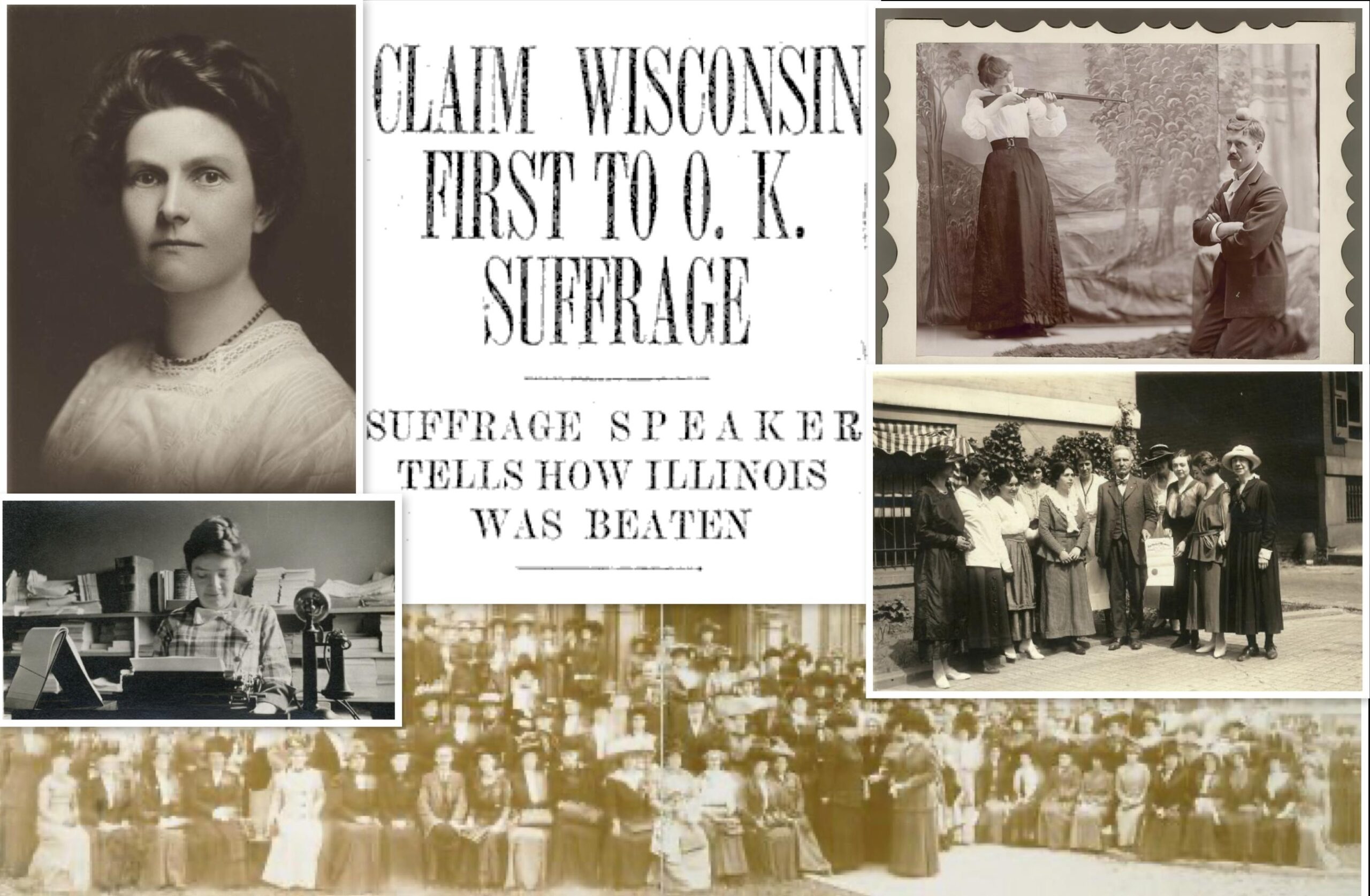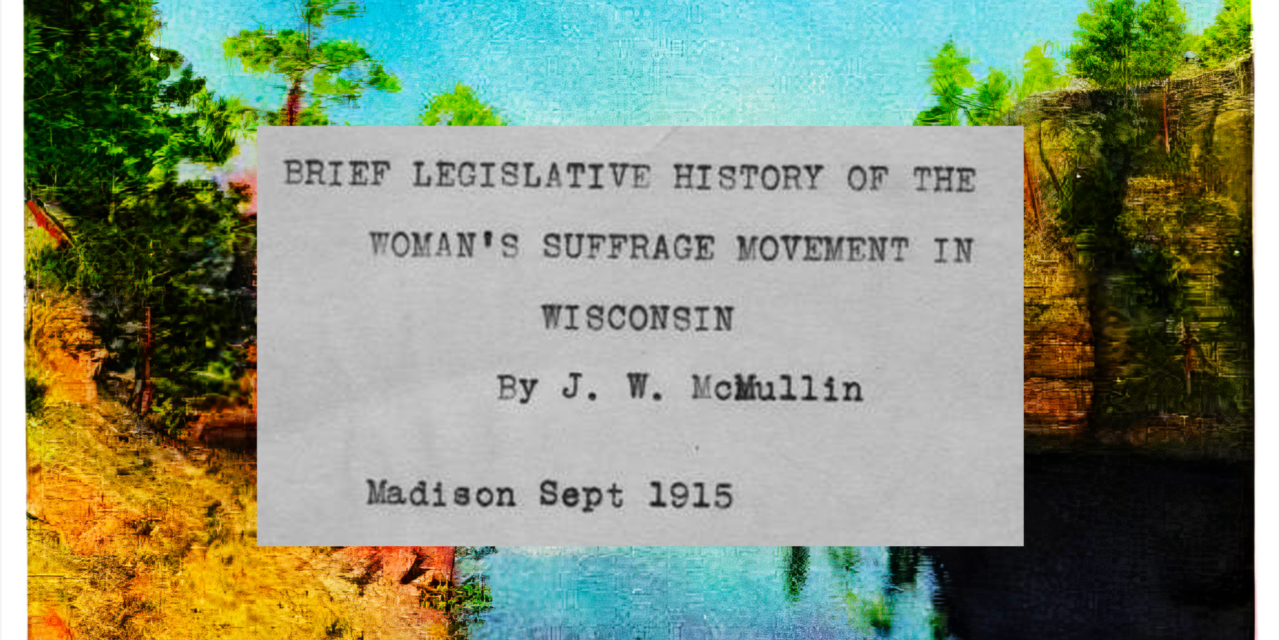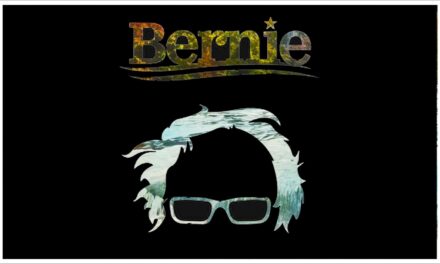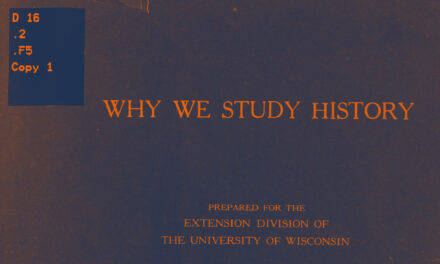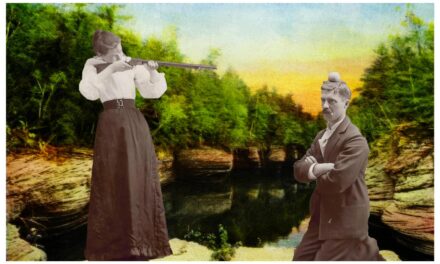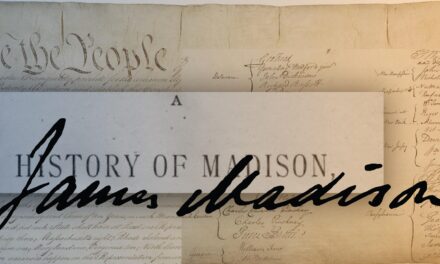“I am a progressive because I believe that to make government intelligent we must organize into groups to discuss and study public problems. As long as this group is organized for the single purpose of getting more light upon public questions and fearlessly acts, I shall be proud to be a part of it.”
The following is a timeline and account of the Women’s suffrage movement in Wisconsin while still in the midst of it. The author, Jennie Willing McMullin Turner, born on January 4, 1885, near Hymera, Indiana, was a pivotal figure in the Woman’s Suffrage Movement in Wisconsin. After obtaining her Bachelor’s degree from the University of Chicago in 1908 and her Master of Arts in History from the University of Wisconsin-Madison, Turner embarked on a multifaceted career. She served as a reference librarian at UW-Madison, authored various texts, and earned her Ph.D. in Economics and Political Science while working for the State Board of Education.
Turner’s involvement in suffrage activism was extensive; she not only documented suffrage history but actively participated in shaping it. Her dedication to the cause led her to speak at suffrage conventions, challenge proposals within the Wisconsin Woman Suffrage Association, and hold positions such as Corresponding Secretary. Turner’s commitment extended beyond suffrage; she advocated for women’s rights in labor, education, and civic engagement. Even in retirement, she continued her advocacy through writing and supporting legislative initiatives. Turner passed away on June 29, 1967, leaving behind a legacy of tireless activism and dedication to social progress.
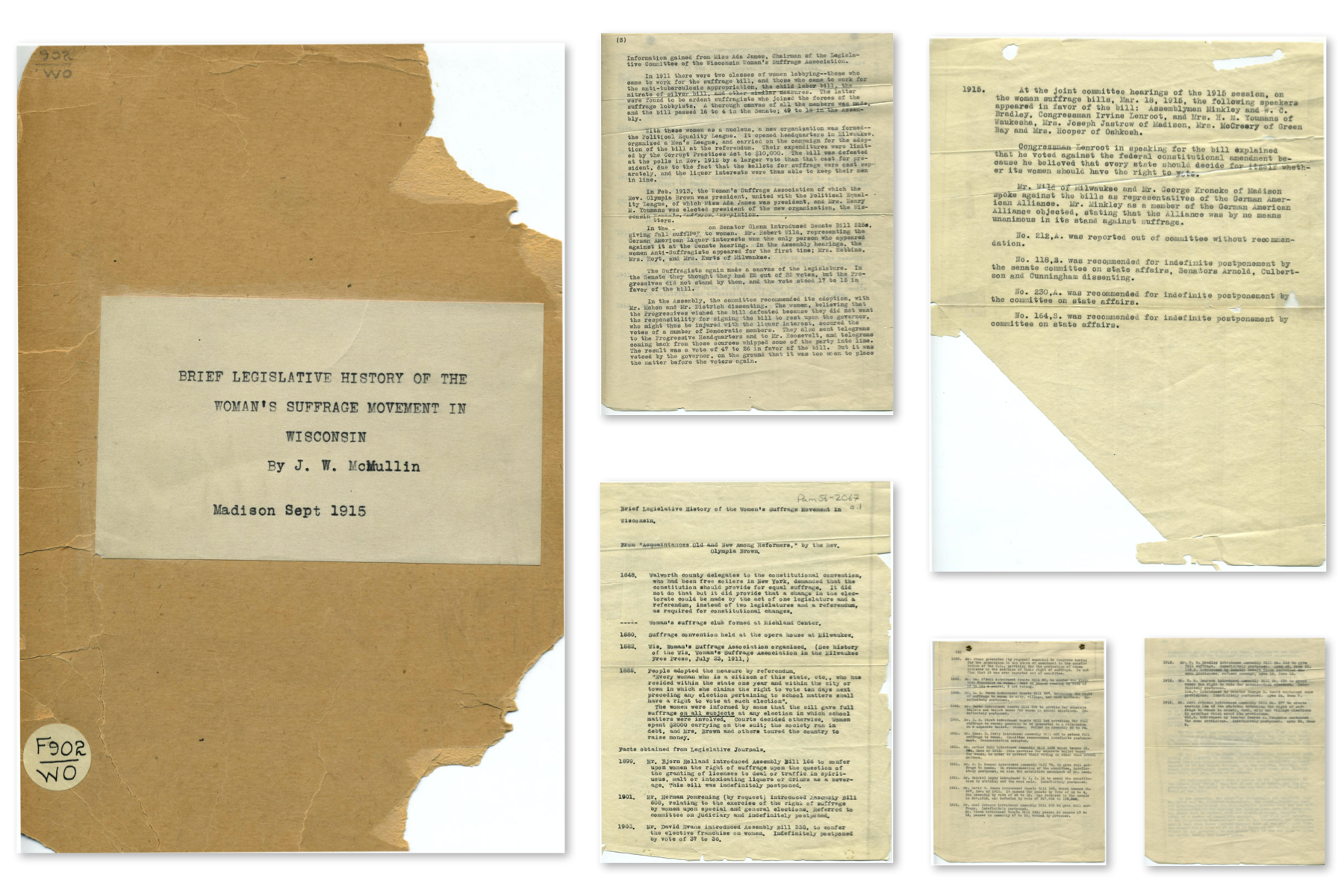
BRIEF LEGISLATIVE HISTORY OF THE WOMEN’S SUFFRAGE MOVEMENT IN WISCONSIN
By J. W. McMullin
Madison, Sept. 1915
Brief Legislative History of the Women’s suffrage Movement in Wisconsin, from “Acquaintances Old and New Among Reformers,” by the Rev. Olympia Brown.
Walworth county delegates to the constitutional convention, who had been free soilers in New York, demanded that the constitution should provide for equal suffrage. It did not do that but it did provide that a change in the electorate could be made by the act of one legislature and a referendum, instead of two legislatures and a referendum, as required for constitutional changes.
Woman’s suffrage club formed at Richland Center.
- Suffrage convention held at the opera house at Milwaukee.
- Wis. Woman’s Suffrage Association organized. (See history of the Wis. Woman’s Suffrage Association in the Milwaukee Free Press, July 23, 1911.)
- People adopted the measure by referendum. “Every woman who is a citizen of this state, etc., who has resided within the state one year and within the city or town in which she claims the right to vote ten days next preceding any election pertaining to school matters shall have a right to vote at such election”. The women were informed by some that the bill gave full suffrage on all subjects at any election in which school matters were involved. Courts decided otherwise. Women spent $2000 carrying on the suit; the society ran in debt, and Mrs. Brown and others toured the country to raise money.
Facts obtained from Legislative Journals.
- Mr. Bjorn Holland introduced Assembly Bill 166 to confer upon women the right of suffrage upon the question of the granting of licenses to deal or traffic in spirituous, malt or intoxicating liquors or drinks as a beverage. This bill was indefinitely postponed.
- Mr. Herman Pomrening (by request) introduced Assembly Bill 608, relating to the exercise of the right of suffrage by women upon special and general elections. Referred to committee on judiciary and indefinitely postponed.
- Mr. David Evans introduced Assembly Bill 338, to confer the elective franchise on women. Indefinitely postponed by vote of 37 to 35.
Evans presented (by request) memorial to Congress asking for the submission to the state of amendment to the constitution of the U.S., providing for the protection of women citizens in the exercise of their right of suffrage. Do not find that it was ever reported out of committee.
- Mr. Wm. O’Neil introduced Senate Bill 80, to confer the elective franchise on women. Lost on second reading by vote of 16 to 12, 4 paired, 2 not voting.
- Mr. M. E. Burns introduced Senate Bill 397, extending the right of suffrage to women in city, village, and town matters. Indefinitely postponed.
Mr. Burns introduced Senate Bill 398 to provide for separate ballots and ballot boxes for women in school elections. Indefinitely postponed.
- Mr. J. H. Stout introduced Senate Bill 144 providing for full suffrage to women; question to be presented to a referendum on a separate ballot. Passed. Failed in Assembly 53 to 34.
- Mr. Chas. B. Perry introduced Assembly Bill 403 to extend full suffrage to women. Committee recommended indefinite postponement. Recommendation accepted.
Mr. Arthur Kahn introduced Assembly Bill 1028 which became Ch. 384, Laws of 1911; This provides for separate ballot boxes for women voting for school officers or on school matters other than matter of issuing bonds.
Mr. J. H. Kamper introduced Assembly Bill 79, to give full suffrage to women. On recommendation of the committee, indefinitely postponed, as also the substitute amendment of Mr. Reed.
Mr. Gabriel Zophy introduced S. J. R. 16 to amend the constitution by striking out the word male. Indefinitely postponed.
Mr. David G. James introduced Senate Bill 102, which became Ch. 227, laws of 1911. It passed the Senate by vote of 16 to 4, the Assembly by vote of 49 to 18. Was referred to the people in Nov. 1912, and defeated by vote of 227,024 to 135,546.
- Mr. Axel Johnson introduced Assembly Bill 570 to give full suffrage. Indefinitely postponed.
Mr. Glenn introduced Senate Bill 225; passed in Senate 17 to 15, passed in Assembly 47 to 26; vetoed by governor.
- Mr. W. C. Bradley introduced Assembly Bill No. 212 to give full suffrage. Indefinitely postponed. Ayes 49, Noes 41.
118,S. introduced by Senator Robert Glenn – contained same provisions, refused passage. Ayes 15, Noes 18.
Mr. H. M. Laursen introduced Assembly Bill No. 230 to grant women the right to vote for presidential electors. Indefinitely postponed.
164,S. introduced by Senator George E. Scott contained same provisions. Indefinitely postponed. Ayes 24, Noes 7.
Mr. Axel Johnson introduced Assembly Bill No. 577 to create section 12m of the statutes extending the right of suffrage to women in county, town, city and village elections in counties which adopt its provisions.
412,S. introduced by Senator Pearce A. Tompkins contained the same provisions. Indefinitely postponed. Ayes 36, Noes 6.
- At the joint committee hearings of the 1916 session, on the woman suffrage bills, Mar. 13, 1915, the following speakers appeared in favor of the bill: Assemblymen Minkley and W. C. Bradley, Congressman Irvine Lenroot, and Mrs. H. M. Youmans of Waukesha, Mrs. Joseph Jastrow of Madison, Mrs. McCreary of Green Bay and Mrs. Hooper of Oshkosh.
Congressman Lenroot in speaking for the bill explained that he voted against the federal constitutional amendment because he believed that every state should decide for itself whether its women should have the right to vote.
Mr. Hill of Milwaukee and Mr. George Kroneke of Madison spoke against the bills as representatives of the German American Alliance. Mr. Minkley as a member of the German American Alliance objected, stating that the Alliance was by no means unanimous in its stand against suffrage.
No. 212,A. was reported out of committee without recommendation.
No. 118,S. was recommended for indefinite postponement by the senate committee on state affairs. Senators Arnold, Culbertson and Cunningham dissenting.
No. 230,A. was recommended for indefinite postponement by the committee on state affairs.
No. 164,S. was recommended for indefinite postponement by committee on state affairs.
Information gained from Miss Ada James, Chairman of the Legislative Committee of the Wisconsin Woman’s Suffrage Association.
In 1911 there were two classes of women lobbying—those who came to work for the suffrage bill, and those who came to work for the anti-tuberculosis appropriation, the child labor bill, the nitrate of silver bill, and other similar measures. The latter were ardent suffragists who joined the lobbying forces of the suffragists. A thorough canvas of all the members was made, and the bill passed 16 to 4 in the Senate, 49 to 18 in the Assembly.
With these women as a nucleus, a new organization was formed—the Political Equality League. It opened headquarters in Milwaukee, organized a Men’s League, and carried on the campaign for the adoption of the bill at the referendum. Their expenditures were limited by the Corrupt Practices Act to $10,000. The bill was defeated at the polls in Nov. 1912 by a larger vote than that cast for president, due to the fact that the ballots for suffrage were cast separately, and the liquor interests were thus able to keep their men in line.
In Feb. 1913, the Woman’s Suffrage Association of which the Rev. Olympia Brown was president, united with the Political Equality League, of which Miss Ada James was president, and Mrs. Henry M. Youmans was elected president of the new organization, the Wisconsin Woman’s Suffrage Association.
In the 1913 session, Senator Glenn introduced Senate Bill 225a, giving full suffrage to women. Mr. Robert Wild, representing the German American Liquor interests was the only person who appeared against it at the Senate hearing. In the Assembly hearings, the women Anti-Suffragists appeared for the first time; Mrs. Robbins, Mrs. Hoyt, and Mrs. Kurts of Milwaukee.
The Suffragists again made a canvas of the legislature. In the Senate they thought they had 22 out of 33 votes, but the Progressives did not stand by them, and the vote stood 17 to 15 in favor of the bill.
In the Assembly, the committee recommended its adoption, with Mr. Mahon and Mr. Dietrich dissenting. The women, believing that the Progressives wished the bill defeated because they did not want the responsibility for signing the bill to rest upon the governor, who might thus be injured with the liquor interests, secured the votes of a number of Democratic members. They also sent telegrams to the Progressive Headquarters and to Mr. Roosevelt, and telegrams coming back from those sources whipped some of the party into line. The result was a vote of 47 to 26 in favor of the bill. But it was vetoed by the governor, on the ground that it was too soon to place the matter before the voters again.
